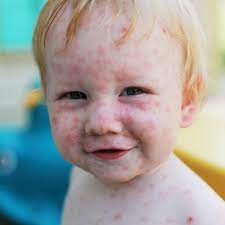The World Health Organization (WHO) highlights that immunization is one of the greatest successes of modern medicine. And expanding access is critical to achieving the Sustainable Development Goals (SDGs).
Today, vaccination prevents 2 to 3 million deaths each year. Costa Rica has a vaccination scheme that includes 13 vaccines that protect the Costa Rican population against more than 12 preventable diseases such as influenza, tuberculosis, rotavirus, polio, measles, rubella, hepatitis B, and chickenpox.
Among the diseases preventable through vaccination is chickenpox, an infection that mostly affects children. This is caused by the varicella zoster virus, which is a type of herpes virus and produces a rash on the skin in the form of small blisters or scabs.
Impact of chickenpox in children

In children with normal immune systems, chicken pox is usually not serious. Most people with chicken pox only get lesions on the skin and in the mouth. However, sometimes the virus infects the lungs, brain, heart, and liver.
These serious infections are more common in newborns, adults, and people with weakened immune systems. In this group are people with HIV or who take drugs to suppress the immune system or high doses of corticosteroids.
The epidemiology of chickenpox varies globally. In high-income countries with a temperate climate, chickenpox is often a childhood illness with seasonal variations. Before vaccination, more than 90% of infections occurred before adolescence.
While in some tropical countries, on the contrary, the average age of infection is higher, and adolescents and adults show greater susceptibility compared to temperate regions.
Higher population density, which may be associated with greater urbanization, and early schooling are also associated with a high incidence of chickenpox.
Vaccination is the best protection
Chickenpox is spread through airborne moisture droplets containing the varicella zoster virus, by contact with the chickenpox rash or from a pregnant woman to the fetus.
Symptoms are varied and begin between 7 and 21 days after infection:
• Mild headache
• Moderate fever,
• Lack of appetite
• General feeling of discomfort
“Vaccines save lives and must be maintained even during the Covid-19 pandemic. The most vulnerable people should not suffer the consequences of not receiving the vaccines they need”, said Dr. Gustavo Lazo, specialist in Pediatrics and Sub-specialist in Clinical Immunology.
“In these times of crisis, no vaccine-preventable disease should reemerge as a result of the lack of vaccination, as our health systems are prone to collapse. Today more than ever the right to the prevention of the disease is in force, before its treatment”, added the specialist.
Vaccination against chickenpox is the measure to prevent the disease and at the same time avoid the most serious complications.
Children and adolescents should receive 2 doses, according to the following scheme:
• Young children should receive the first dose of the vaccine between 12 and 15 months of age and the second, between 4 and 6 years, as part of the routine childhood immunization plan.
• Children ages 7 to 12 who have not been vaccinated should receive 2 doses of chickenpox vaccine at least 3 months apart.
• Adolescents 13 years and older and adults who have not been vaccinated should also receive 2 doses of the vaccine to catch up, and these doses must be given 4 to 8 weeks apart.

